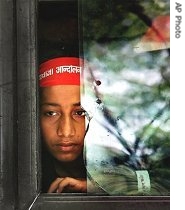2007年VOA标准英语-Britain Marks Bicentenary of Abolition of Slave(在线收听)
London
23 March 2007
Britain is commemorating the 200th anniversary of the passage of the law that abolished the trans-Atlantic slave trade March 25 1807. One of the most poignant of the events is "Slave Britain," a photographic exhibition at St. Paul's cathedral in London. The exhibition illustrates that, while the trans-Atlantic trade in human beings was abolished 200 years ago, slavery still thrives in Britain, although in different forms. Tendai Maphosa reports for VOA from London.
Today's slaves do not come on a boat. Neither are they branded or shackled and not all of them come from Africa. In fact most of them come into Britain legally and on their own, usually lured by promises of a good job.
The St. Paul exhibition, called "Slave Britain," shows pictures of some of the women who believed the promises and ended up as prostitutes or overworked, badly treated and grossly underpaid domestic servants. They all have one thing in common - they come from very poor countries.
"What we are trying to do is to highlight that slavery trade continues to this day; that human trafficking takes place in this country, which I think will surprise many people," says Anglican cleric, Canon Ed Newell, the cathedral's spokesperson.
Anti-Slavery International, which was founded by some of the 19th century abolitionists, is also involved in the exhibition. It's spokesperson, Beth Herzfeld, says slavery is widespread.
"At least 12 million people are in slavery; there is no area that's free from slavery and you will find slavery in most countries," she explained.
Herzfeld says slavery takes many forms, but the victims suffer the same consequences.
 |
| A rescued child laborer looks out from the window of a bus as he arrives to participate in a march against child trafficking, in New Delhi, India, 22 Mar 2007 |
The trans-Atlantic slave trade saw at least 10 million Africans transported to the so-called New World - the Americas and the Caribbean islands to provide labor for the European settlers. It is estimated that some two million Africans died during what is now called the Middle Passage, the voyage between Africa and their destinations.
Britain is home to some of the descendants of those who made it to the Caribbean and worked on the sugar plantations. One of them is Pepukai who moved to London from Jamaica. He is a member of the Pan African Congress Movement and other organizations which represent the interests of the black community.
He does not think much of the anniversary, which, he says, celebrates the British abolitionists without acknowledging the role played by black people in their own liberation. He described the events around the anniversary as "a guise to delay the whole business of reparations."
He says the issues of apologies for slavery by the British government and paying reparations are inexorably intertwined.
"If I go into somebody's house, wreck their house, ransack it, loot all the possessions and burn it down and then turn around and say I am sorry and walk away what does that mean? To say sorry is to say this will never, never happen again. But most importantly is that you have committed a crime . How do you now make good on the crime that you have committed? England would not be what it is, the whole of Europe would not be what it is, the whole of America would not be what it is had it not been for the enslavement of our people who labored brutally to build the wealth that is now the capitalism that governs the entire world that benefits only one group of people, the Europeans," said Pepukai.
While debate about the trans-Atlantic slave trade and its aftermath continues 200 years after its abolition, Britain and other countries are grappling with a new form of slavery that is as insidious as it is illegal.